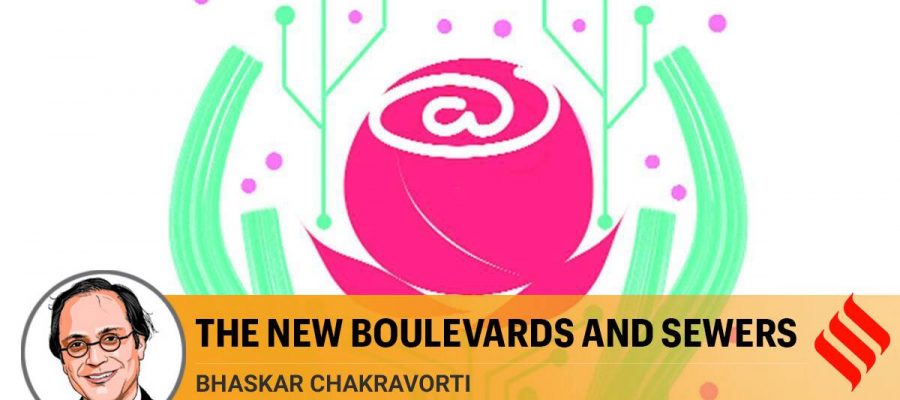It is time to imagine the boulevards and sewers that will emerge at the end of this pandemic. To consider this, we must ask what from 2020 should we reinforce, what must we rebuild and what should we tear down and build again?
2021 is the year we start work on new boulevards and sewers. When much of Paris was rebuilt in the mid-19th century, a medieval tangle of a city was transformed into a glorious metropolis known for its wide boulevards. The idea was to let in sunlight, considered an antidote to cholera, a pandemic with roots in Bengal that travelled all the way to Paris. The boulevards continue to inspire us. Millions of selfies have them as backdrops. Even in places far from Paris, from Lutyens’ re-imagined Delhi to Khedive Ismail’s re-commissioned Cairo, residents may never visit Paris, but can enjoy Parisian boulevards.
Along with those post-pandemic boulevards, Paris also was re-built with a modern sewage system. No selfie potential here, but it had become clear that better sanitation would go a long way in staving off the next cholera outbreak.
We are at that moment in history, again. It is time to imagine the boulevards and sewers that will emerge at the end of this pandemic. To consider this, we must ask what from 2020 should we reinforce, what must we rebuild and what should we tear down and build again?
Let me get us started with one example of each.
Even as the global political machinery bungled the response to the COVID-19 outbreak as 2020 unfolded, the scientific machinery shifted into high gear. Consider this: In the history of medicine, a vaccine has taken a minimum of five years to be developed. And here we are, less than a year since we learned of this dreadful new virus and the first wave of vaccination is underway with clinical trial data that promise unheard-of rates of efficacy.
But now we must reinforce this remarkable scientific feat with a vaccine rollout that could be just as complex in being inclusive, fair and prioritises those who bear the greatest risks. If we can repeat the collective inventiveness of the scientists and companies that brought us the vaccine and get the rollout to mimic the vaccine’s creation, we shall have a true “boulevard” to show off to future generations. This is what we must reinforce in 2021.
Now, for the rebuilding.
The pandemic made us amateur statisticians as we whiled away the hours under lockdown: 82.5 million cases, 1.8 million deaths, worldwide as I write this. The world economy will shrink by 4.4 per cent. India’s economy shrank a staggering 24 per cent in the second quarter of 2020, compared to the same quarter last year. Much of this statistical schooling happened as we had our eyes glued to our screens. The internet was put to its purest test ever: More than a billion children were affected by schools moving online; shopping while socially distancing caused the global e-commerce market to grow by a third; weddings, birthdays, goodbyes and routine office meetings moved onto a hitherto unknown application, Zoom, giving Zoom, the company, a market capitalisation more than that of stalwarts, such as IBM.
Digitalisation is here to stay. This means that in 2021, we shall have to focus on rebuilding that digital edifice which has become home, office, school — and life. Much like drinking water and electricity, from 2021 on, we should expect the internet to be an essential utility. But, of course, the internet and all the paraphernalia that ride on it, are about as far from drinking water or electricity as one can imagine. The edifice is operated by a handful of very powerful and dominant companies. It is constantly being reinvented by very clever entrepreneurs. Each of our interactions with the internet changes it, as our actions contribute data, which will shape the next interaction.
2021 is the year when we begin the task of reconciling the good, the bad and the plain old ugly of digital technology and begin the process of getting it right. The edifice is here and cannot be taken down, so we have to reform it and improve on it — and by that, I don’t mean filing antitrust lawsuits or bemoaning surveillance capitalism or enacting data protection laws. It is all of these and much more, encompassing a rebuilding of user behaviours, supply infrastructure, reforming innovation and regulatory institutions.
Finally, I turn to what we must tear down and build back up.
For much of this young century, the world has experienced economic growth. Poverty rates fell, so it could be argued that the rising tide lifted all boats. But with the tide suddenly going out in 2020 — to re-purpose that old Warren Buffett comment — we got to see who was swimming naked. It turns out that far too many were swimming naked and far too many others had their rags ripped off. COVID-19 was felt disproportionately by those who are poor, have fewer assets, are of the wrong caste or race or ethnic group and work in jobs that are low paid and require showing up for work.
The disadvantages pile up when you consider the fact that those swimming naked are also at a digital disadvantage, have an already compromised health status and because they are less connected and have fewer resources to make their presence felt, they will fall behind in the vaccine queue.
This societal framework is unsustainable and unfair. The work to fix it needs to begin in 2021. Much of this will not be glamorous. Much of this work will require a political will to commit to inclusive re-growth, tearing down the scaffolding that locks in inequities and re-imagining a new social contract. Governments, business and civil society will need to be involved. It is hard and it is messy work.
These are the sewers — the new sanitation systems that must replace the old unsanitary ones. Visually, they do not inspire. No one takes selfies with them. But, as we know, without a way to get the real crap out of the system, the scourge will return. So, let’s not forget the subterranean work even as we busy ourselves with the awe-inspiring boulevards and essential edifices aboveground.
2021 is not the year the pandemic ends. It is only the beginning of that end. If we get the new boulevards and sewers right, it could also become the beginning of a new beginning.
This article first appeared in the print edition on January 1, 2021 under the title ‘The new boulevards and sewers’. The writer is Dean of Global Business at The Fletcher School at Tufts University, and founding executive director of Fletcher’s Institute for Business in the Global Context.
Source: Read Full Article


